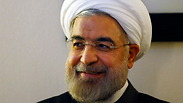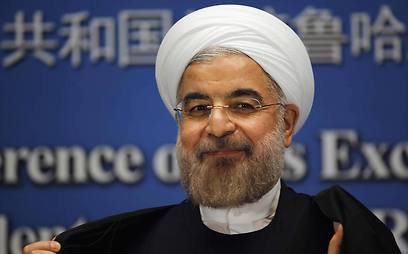
Westen diplomats cool Iran's optimism on nuclear deal
While Rouhani says deal is 'very likely' to be finalized by July deadline, Western diplomats say sides are not much closer than they were in February.
Western diplomats cast doubt Thursday on an optimistic assessment by Iran's president, who said his country will likely meet a July target date for a nuclear deal with six world powers.
Iran and six world powers met last week to start drafting a deal, but the talks broke without that work beginning. Neither side gave details of the differences.
The lack of progress in the Veinna talks between Iran and United States, Russia, China, France, Britain and Germany had raised doubts over the prospects for a breakthrough by the self-imposed July 20 deadline.
Related stories:
- Rouhani: Nuclear talks will lead to agreement 'despite difficulties'
- Report: Iran nuclear talks to resume in June
- US concerned at lack of headway in Iran nuclear talks
President Hassan Rouhani sought to inject optimism into the process on Thursday, telling reporters in Shanghai that a July deal remains "very likely" - although he did not rule out that more time might be needed.
"I think the negotiations have reached a very important and sensitive and tough juncture," Rouhani told a news conference through an English interpreter. He was in China to attend a regional summit this week and held talks with Chinese President Xi Jinping.
"We cannot expect it to be resolved in just a couple of meetings, but we are not pessimistic about the final agreement. We still have time. We can achieve this. We can even do it by the deadline."
An interim deal between Iran and the five permanent members of the UN Security Council plus Germany was reached in November in Geneva, aimed at persuading Iran to curb parts of its nuclear work, in return for a limited easing of sanctions.
Rouhani said an early deal would benefit all but there was "no rush" to finalize the talks. If the deadline was not met, the interim agreement could be extended for another six months, he said.
"The signs, the indications that we have been receiving in the past few days, are telling us that it is very likely that we can come to an agreement by the end of July," he said.
To reach a deal by the deadline will require good will on the part of the six countries opposite Iran at the negotiating table. In addition, "some certain countries behind the scenes who want to create problems" should not be given a chance to "sabotage" the talks, he said.
"If we don't achieve success it means that the other side is very stubborn because my government is ready to be logical, is ready to interact with the rest of the world and cooperate with the rest of the world," he said.
After three months of mostly comparing expectations rather than negotiating compromises, the sides had intended to start drafting a final agreement in the Vienna talks that could end more than a decade of enmity and mistrust and dispel fears of a wider Middle East war.
But two Western diplomats told The Associated Press the two sides are not much closer than they were in February, at the start of the latest round of talks aimed at putting constraints on Tehran's nuclear activities in exchange for sanctions relief. The diplomats spoke only on condition of anonymity because they were not authorized to discuss the talks.
The diplomats said a UN report expected Friday will certify that Iran - which denies any interest in nuclear weapons - is honoring a preliminary deal committing it to limiting certain nuclear activities, including ending enrichment to a level only a technical step from weapons-grade uranium.
Spokeswoman Gill Tudor said the UN atomic agency would not comment until the report is published.
The main differences, according to the Western diplomats, include:
- The United States and its Western allies want to limit Iran to 3,000 centrifuges to churn out reactor fuel-grade enriched uranium. Iran last week insisted it needs 100,000.
- The West wants Iran to reconfigure a nearly finished reactor that would produce substantial waste plutonium, another pathway to nuclear arms. Iran is refusing.
- The US wants a heavily fortified underground enrichment facility shut or repurposed. Iran says no.











